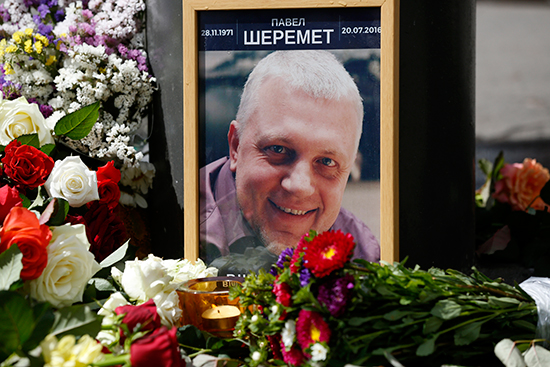New York, July 20, 2016 — Ukrainian authorities must credibly investigate the murder of award-winning journalist Pavel Sheremet and ensure all those responsible are swiftly brought to justice, the Committee to Protect Journalists said today. Sherement, 44, was killed in Kiev today after an explosive device detonated under the car he was driving.
Sheremet, who wrote for the independent news website Ukrainska Pravda, was driving to the offices of the independent broadcaster Radio Vesti, where he also hosted a morning radio show, when the car he was driving exploded, Ukrainska Pravda and The New York Times reported. Ukrainian Prosecutor General Yuriy V. Lutsenko said that a car bomb had caused the explosion, according to press reports. Sheremet was a 1998 recipient of CPJ’s International Press Freedom Award.
“We honored Pavel Sheremet in 1998 with an International Press Freedom Award in recognition of his courage, his integrity, and his commitment to the highest ideals of journalism,” CPJ Executive Director Joel Simon said. “He upheld those standards through his years even as he mentored and inspired a generation of journalists in Ukraine. His killers cannot be allowed to get away with this terrible crime.”
In September 2000, Georgy Gongadze, then the editor of Ukrainska Pravda, was abducted and beheaded. The manner in which the investigation into his murder was conducted made many in Ukraine doubt its sincerity, CPJ reported at the time.
Ukrainian President Petro Poroshenko condemned Sheremet’s murder, requested that top law enforcement officials personally oversee the probe, and urged them to seek assistance from the FBI and other international law enforcement experts, according to a statement on the president’s website.
In his work for Ukrainska Pravda, Sheremet commented on political developments in Ukraine, Russia, and his native Belarus. He had recently written about Ukrainian volunteer battalion fighters’ joining criminal gangs after leaving the militias, petty corruption among police in Belarus, alleged corruption among Ukrainian government officials and police, and the work of Russian government propagandists.
According to reports in the local and international press, investigators said that they were investigating Sheremet’s journalism as the primary motive in a case of premeditated murder. Authorities also said they were investigating the possibility that the killers had sought to kill Alena Pritula, owner and former editor of Ukrainska Pravda, whose car Sheremet was driving when he died, Ukrainska Pravda reported. Poroshenko ordered law enforcement agencies to place Pritula under protection, Ukrainska Pravda said.
Sheremet’s friends told journalists that he and Pritula had complained of being followed in Kiev. Sheremet told Reuters in October 2015 that he did not feel safe visiting Moscow, where had previously worked as a journalist.
“I’m threatened often and given hints. Every time I go to Moscow, it’s like I’m in a minefield,” he told the news agency.
Sheremet was originally from Belarus, where he edited independent newspaper Belarusskaya Delovaya Gazeta. He had also worked as a bureau chief for the now defunct Russian television station ORT, which was often critical of authorities. In 1997, Belarussian authorities jailed him for three months in connection to his reporting, and stripped him of his citizenship in 2010.
